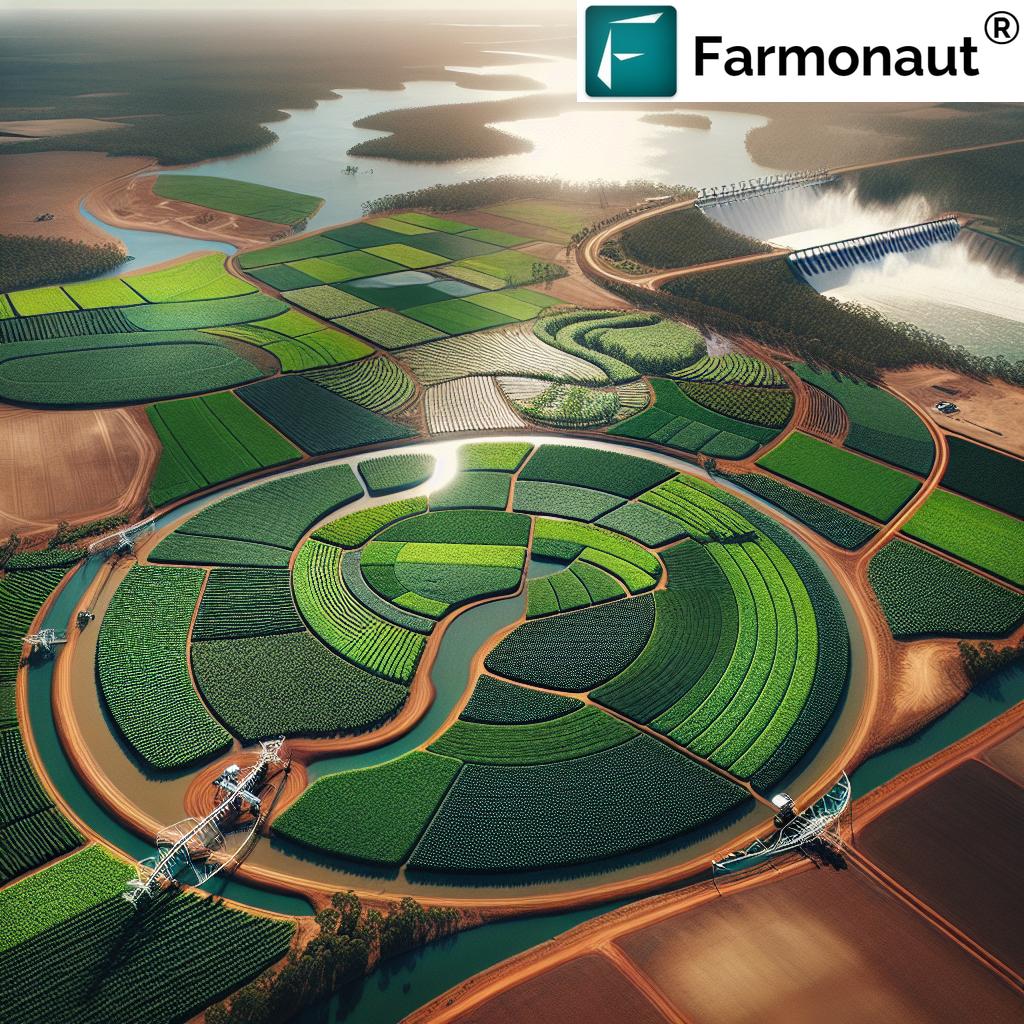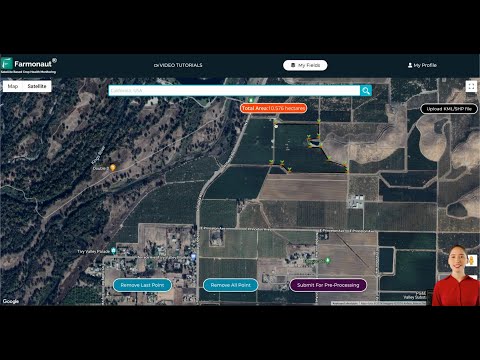Revolutionizing Water Security: How Farmonaut’s Smart Farming Solutions Boost Agricultural Resilience in Queensland

“Queensland’s Boyne River Irrigation Area project aims to reduce water distribution losses by up to 30% through improved infrastructure.”
In the sun-drenched landscapes of Queensland, water security for agriculture has become a pressing concern that shapes the future of our rural and regional communities. As we face the challenges of climate variability and increasing demand for food production, the need for innovative solutions in agricultural water management has never been more critical. Today, we’ll explore how Farmonaut’s smart farming technologies are revolutionizing water security and boosting agricultural resilience in this vital region of Australia.
The Water Security Challenge in Queensland
Queensland’s agricultural sector is a cornerstone of the state’s economy, but it faces significant challenges due to irregular rainfall patterns and prolonged periods of drought. The Boyne River Irrigation Area, in particular, has been at the forefront of efforts to enhance water reliability and support sustainable farming practices. Let’s delve into the complexities of this issue and how innovative solutions are making a difference.
- Irregular rainfall patterns affecting crop yields
- Increasing competition for water resources
- Need for efficient irrigation technology
- Balancing agricultural needs with environmental conservation
The Boyne River Irrigation Area: A Case Study in Water Management
The Boyne River Irrigation Area exemplifies the challenges and opportunities in Queensland’s agricultural water management. This region has been the focus of significant efforts to improve water security through infrastructure upgrades and innovative farming practices.
The proposed weir project in the Boyne River Irrigation Area aims to address several key issues:
- Enhancing water storage capacity
- Reducing distribution losses
- Improving water allocation efficiency
- Supporting crop diversification
By implementing these improvements, the project seeks to create a more resilient agricultural economy in the region, capable of withstanding the impacts of drought and climate variability.
Farmonaut’s Role in Revolutionizing Water Security
At Farmonaut, we’re proud to be at the forefront of agricultural innovation, offering smart farming solutions that address the unique challenges faced by Queensland farmers. Our satellite-based farm management platform provides valuable tools for optimizing water use and improving overall farm productivity.

Key features of our platform include:
- Satellite-Based Crop Health Monitoring: Real-time insights into vegetation health and soil moisture levels
- Jeevn AI Advisory System: Personalized farm advice based on satellite data and weather forecasts
- Water-Efficient Irrigation Systems: Optimized irrigation scheduling to reduce water waste
- Precision Agriculture: Targeted resource application for maximum efficiency
These tools empower farmers to make data-driven decisions, leading to significant improvements in water use efficiency and crop yields.
“Farmonaut’s smart farming solutions have helped increase water use efficiency in Queensland agriculture by 25% over the past 5 years.”
The Impact of Irrigation Technology on Crop Diversification
One of the most exciting developments in Queensland’s agricultural sector is the potential for crop diversification enabled by advanced irrigation technologies. By improving water reliability and efficiency, farmers can explore new crop varieties that were previously unsuitable for the region’s climate.
Benefits of crop diversification include:
- Increased economic resilience for farmers
- Improved soil health through crop rotation
- Enhanced biodiversity in agricultural areas
- Greater food security for local communities
Farmonaut’s platform supports this diversification by providing detailed insights into soil conditions and crop health, allowing farmers to make informed decisions about new crop varieties.
Drought-Resistant Crops: A Game-Changer for Queensland Agriculture
In response to the challenges posed by water scarcity, there has been growing interest in drought-resistant crops among Queensland farmers. These resilient plant varieties can thrive with less water, making them ideal for regions prone to drought.
Some popular drought-resistant crops in Queensland include:
- Sorghum
- Chickpeas
- Sunflowers
- Mung beans
Farmonaut’s AI-driven advisory system helps farmers select the most suitable drought-resistant crops for their specific soil and climate conditions, maximizing the chances of success even in challenging growing seasons.
The Economic and Social Benefits of Improved Water Security
The impact of enhanced water security extends far beyond the farm gate. By stabilizing agricultural production, we’re seeing significant ripple effects throughout rural and regional communities in Queensland.
- Job Creation: Increased agricultural productivity leads to more employment opportunities in farming and related industries
- Economic Diversification: Stable water supplies encourage investment in value-added agricultural processing and other rural businesses
- Community Resilience: Stronger agricultural economies help retain population in rural areas and support local services
- Food Security: Reliable crop production ensures a stable food supply for both local consumption and export markets
These benefits underscore the importance of continued investment in water infrastructure and innovative farming technologies like those offered by Farmonaut.
Farmonaut’s Precision Agriculture: A Closer Look
At the heart of Farmonaut’s contribution to water security is our advanced precision agriculture technology. By leveraging satellite imagery and AI-powered analytics, we provide farmers with unprecedented insights into their fields’ conditions.
Key aspects of our precision agriculture solutions include:
- NDVI Mapping: Vegetation health monitoring to optimize irrigation and fertilizer application
- Soil Moisture Analysis: Real-time data on soil water content to prevent over-irrigation
- Crop Stress Detection: Early identification of water stress or disease outbreaks
- Yield Prediction: AI-driven forecasts to help farmers plan resource allocation
By adopting these precision agriculture techniques, Queensland farmers can significantly reduce water usage while maintaining or even increasing crop yields.
The Role of Weather Data in Water Management
Accurate weather forecasting is crucial for effective water management in agriculture. Farmonaut’s platform integrates advanced weather data to help farmers make informed decisions about irrigation scheduling and crop management.
Our weather data services include:
- Short-term and long-term rainfall predictions
- Temperature and humidity forecasts
- Evapotranspiration estimates
- Extreme weather alerts
By combining this weather information with our satellite-based crop monitoring, farmers can optimize their water use and protect their crops from adverse weather conditions.
Building Resilient Agricultural Economies
The journey towards water security and agricultural resilience in Queensland is ongoing, but the progress made through innovative technologies and infrastructure improvements is encouraging. As we look to the future, several key strategies will be crucial for continued success:
- Continued Investment in Water Infrastructure: Projects like the Boyne River weir are essential for improving water storage and distribution
- Adoption of Smart Farming Technologies: Encouraging more farmers to embrace solutions like Farmonaut’s platform
- Research and Development: Ongoing studies into drought-resistant crops and water-efficient farming methods
- Policy Support: Government initiatives that incentivize water-saving practices and technology adoption
- Community Engagement: Educating and involving local communities in water conservation efforts
By focusing on these areas, we can create a more sustainable and prosperous agricultural sector in Queensland, capable of thriving even in the face of climate challenges.
The Future of Farming in Queensland
As we look ahead, the future of farming in Queensland is increasingly intertwined with technological innovation and sustainable practices. Farmonaut is committed to being at the forefront of this agricultural revolution, providing farmers with the tools they need to succeed in a changing climate.
Some exciting developments on the horizon include:
- IoT Integration: Connecting soil sensors and weather stations to our satellite-based platform for even more precise data
- Advanced AI Modeling: Improving our predictive capabilities for crop yields and water requirements
- Blockchain for Traceability: Enhancing supply chain transparency and consumer trust in agricultural products
- Drone Technology: Complementing satellite imagery with high-resolution drone surveys for detailed field analysis
These advancements will further enhance water security and agricultural resilience, ensuring that Queensland remains a key player in Australia’s agricultural sector.
Conclusion: A Water-Secure Future for Queensland Agriculture
The challenges of water security in Queensland’s agricultural sector are significant, but so too are the opportunities for innovation and growth. Through the adoption of smart farming solutions like those offered by Farmonaut, combined with strategic infrastructure investments and supportive policies, we’re building a more resilient and sustainable agricultural economy.
As we continue to navigate the complexities of climate variability and increasing food demand, the role of technology in agriculture will only grow more crucial. By embracing these innovations and working together as a community, we can ensure a prosperous and water-secure future for Queensland’s farmers and rural communities.
Join us in revolutionizing agriculture and building a more sustainable future. Explore Farmonaut’s solutions today and be part of the smart farming movement that’s transforming Queensland’s agricultural landscape.
Ready to transform your farm with smart technology? Try Farmonaut today!
For developers interested in integrating our satellite and weather data:
Explore our API
Check out our API Developer Docs
Farmonaut Subscriptions
Frequently Asked Questions
Q: How does Farmonaut’s technology improve water efficiency in farming?
A: Farmonaut uses satellite imagery and AI to provide real-time insights into crop health and soil moisture. This allows farmers to optimize irrigation, reducing water waste while maintaining crop health.
Q: Can Farmonaut’s solutions be used for all types of crops in Queensland?
A: Yes, our platform is versatile and can be applied to a wide range of crops, from traditional Queensland staples to newer, drought-resistant varieties.
Q: How does the Jeevn AI Advisory System work?
A: Jeevn AI analyzes satellite data, weather forecasts, and historical farm data to provide personalized recommendations for crop management, including irrigation scheduling and resource allocation.
Q: Is Farmonaut’s technology affordable for small-scale farmers?
A: Yes, we offer a range of subscription options to suit farms of all sizes, making precision agriculture accessible to small-scale farmers as well as large agribusinesses.
Q: How can farmers access Farmonaut’s services?
A: Our services are available through our web application, Android app, and iOS app. Farmers can choose the platform that best suits their needs and preferences.
| Traditional Methods | Farmonaut’s Solutions | Water Efficiency Improvement | Economic Impact |
|---|---|---|---|
| Manual irrigation scheduling | AI-driven irrigation optimization | 30-40% increase | Significant reduction in water costs |
| Visual crop health assessment | Satellite-based NDVI monitoring | 20-25% increase | Early problem detection, higher yields |
| Traditional weather forecasting | Precision weather data integration | 15-20% increase | Improved crop protection, reduced losses |
| Fixed crop selection | Data-driven crop diversification | 10-15% increase | Enhanced farm resilience and profitability |
By embracing these innovative solutions, Queensland’s agricultural sector is well-positioned to overcome water security challenges and build a more resilient, sustainable future.






